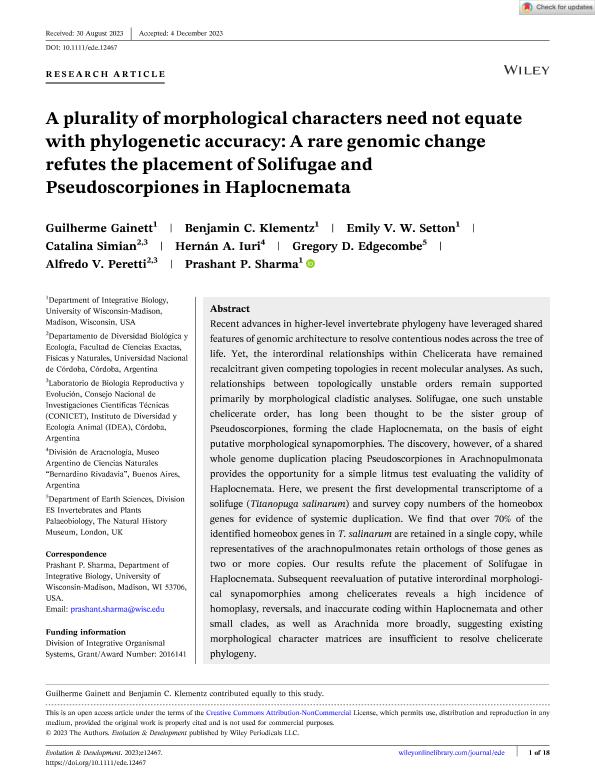Mostrar el registro sencillo del ítem
dc.contributor.author
Gainett, Guilherme
dc.contributor.author
Klementz, Benjamin C.
dc.contributor.author
Setton, Emily V. W.
dc.contributor.author
Simian, Catalina

dc.contributor.author
Iuri, Hernán Augusto

dc.contributor.author
Edgecombe, Gregory D.
dc.contributor.author
Peretti, Alfredo Vicente

dc.contributor.author
Sharma, Prashant P.
dc.date.available
2024-02-26T13:29:43Z
dc.date.issued
2023-12
dc.identifier.citation
Gainett, Guilherme; Klementz, Benjamin C.; Setton, Emily V. W.; Simian, Catalina; Iuri, Hernán Augusto; et al.; A plurality of morphological characters need not equate with phylogenetic accuracy: A rare genomic change refutes the placement of Solifugae and Pseudoscorpiones in Haplocnemata; Wiley Blackwell Publishing, Inc; Evolution & Development; e12467; 12-2023; 1-18
dc.identifier.issn
1520-541X
dc.identifier.uri
http://hdl.handle.net/11336/228393
dc.description.abstract
Recent advances in higher-level invertebrate phylogeny have leveraged shared features of genomic architecture to resolve contentious nodes across the tree of life. Yet, the interordinal relationships within Chelicerata have remained recalcitrant given competing topologies in recent molecular analyses. As such, relationships between topologically unstable orders remain supported primarily by morphological cladistic analyses. Solifugae, one such unstable chelicerate order, has long been thought to be the sister group of Pseudoscorpiones, forming the clade Haplocnemata, on the basis of eight putative morphological synapomorphies. The discovery, however, of a shared whole genome duplication placing Pseudoscorpiones in Arachnopulmonata provides the opportunity for a simple litmus test evaluating the validity of Haplocnemata. Here, we present the first developmental transcriptome of a solifuge (Titanopuga salinarum) and survey copy numbers of the homeobox genes for evidence of systemic duplication. We find that over 70% of the identified homeobox genes in T. salinarum are retained in a single copy, while representatives of the arachnopulmonates retain orthologs of those genes as two or more copies. Our results refute the placement of Solifugae in Haplocnemata. Subsequent reevaluation of putative interordinal morphological synapomorphies among chelicerates reveals a high incidence of homoplasy, reversals, and inaccurate coding within Haplocnemata and other small clades, as well as Arachnida more broadly, suggesting existing morphological character matrices are insufficient to resolve chelicerate phylogeny.
dc.format
application/pdf
dc.language.iso
eng
dc.publisher
Wiley Blackwell Publishing, Inc

dc.rights
info:eu-repo/semantics/openAccess
dc.rights.uri
https://creativecommons.org/licenses/by-nc-sa/2.5/ar/
dc.subject
ARACHNOPULMONATA
dc.subject
GENOME DUPLICATION
dc.subject
PARALOGY
dc.subject
PSEUDOSCORPIONES
dc.subject
RARE GENOMIC CHANGES
dc.subject
SOLIFUGAE
dc.subject.classification
Zoología, Ornitología, Entomología, Etología

dc.subject.classification
Ciencias Biológicas

dc.subject.classification
CIENCIAS NATURALES Y EXACTAS

dc.title
A plurality of morphological characters need not equate with phylogenetic accuracy: A rare genomic change refutes the placement of Solifugae and Pseudoscorpiones in Haplocnemata
dc.type
info:eu-repo/semantics/article
dc.type
info:ar-repo/semantics/artículo
dc.type
info:eu-repo/semantics/publishedVersion
dc.date.updated
2024-02-09T14:49:12Z
dc.journal.number
e12467
dc.journal.pagination
1-18
dc.journal.pais
Reino Unido

dc.journal.ciudad
Londres
dc.description.fil
Fil: Gainett, Guilherme. University of Wisconsin; Estados Unidos
dc.description.fil
Fil: Klementz, Benjamin C.. University of Wisconsin; Estados Unidos
dc.description.fil
Fil: Setton, Emily V. W.. University of Wisconsin; Estados Unidos
dc.description.fil
Fil: Simian, Catalina. Universidad Nacional de Córdoba. Facultad de Ciencias Exactas, Físicas y Naturales. Departamento de Diversidad Biológica y Ecológica; Argentina. Consejo Nacional de Investigaciones Científicas y Técnicas. Centro Científico Tecnológico Conicet - Córdoba. Instituto de Diversidad y Ecología Animal. Universidad Nacional de Córdoba. Facultad de Ciencias Exactas Físicas y Naturales. Instituto de Diversidad y Ecología Animal; Argentina
dc.description.fil
Fil: Iuri, Hernán Augusto. Consejo Nacional de Investigaciones Científicas y Técnicas. Oficina de Coordinación Administrativa Parque Centenario. Museo Argentino de Ciencias Naturales "Bernardino Rivadavia"; Argentina
dc.description.fil
Fil: Edgecombe, Gregory D.. The Natural History Museum; Reino Unido
dc.description.fil
Fil: Peretti, Alfredo Vicente. Universidad Nacional de Córdoba. Facultad de Ciencias Exactas, Físicas y Naturales. Departamento de Diversidad Biológica y Ecológica; Argentina. Consejo Nacional de Investigaciones Científicas y Técnicas. Centro Científico Tecnológico Conicet - Córdoba. Instituto de Diversidad y Ecología Animal. Universidad Nacional de Córdoba. Facultad de Ciencias Exactas Físicas y Naturales. Instituto de Diversidad y Ecología Animal; Argentina
dc.description.fil
Fil: Sharma, Prashant P.. University of Wisconsin; Estados Unidos
dc.journal.title
Evolution & Development

dc.relation.alternativeid
info:eu-repo/semantics/altIdentifier/url/https://onlinelibrary.wiley.com/doi/10.1111/ede.12467
dc.relation.alternativeid
info:eu-repo/semantics/altIdentifier/doi/http://dx.doi.org/10.1111/ede.12467
Archivos asociados
